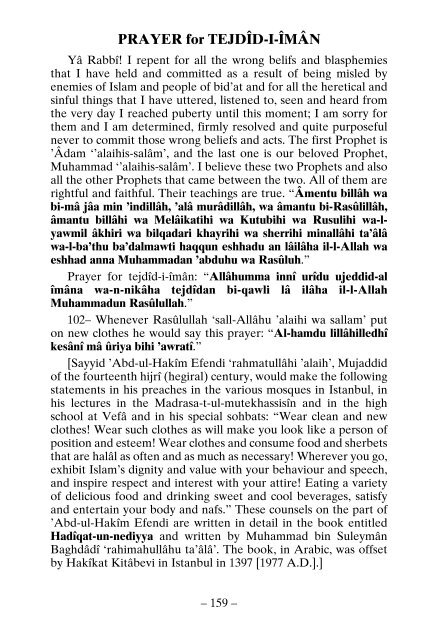O Son !
THE BOOK ‘O SON’ Al-hamdu lillâhi Rabbil ’âlamîn. Wa-s-salâtu wa-s-salâmu ’alâ Rasûlinâ Muhammadin wa Âlihi wa Sahbihi ajma’în. 1– O son! Collecting from books written by the scholars of the Hanafî Madhhab three hundred and sixty hadîth-i-sherîfs and forty-four khabars and also the seven essentials and the five rukns and the seven wâjibs and the fourteen sunnats and the twenty-five mustahabs and the fourteen mufsids of namâz, I have explained them for you. Adapt your acts and deeds to these teachings so that you attain fayz and nejât (salvation)! 2– Also for your information, I have collected a thousand and ninety âdâb (adabs) for you and for other young Muslims like you. If you adapt your actions and acts of worship to these teachings, they will be sufficient for you. If you laze, disobey Allâhu ta’âlâ and cease from these practices and manners, you will be afflicted with slavery and disgrace in the world and subjected to torment in the world to come. If you live up to them and advise your Muslim brothers to do the same, it will be useful for you. They will say blessings over you. And Haqq ta’âlâ will accept their invocations. For, a slave will be pardoned on account of another slave’s invocations for them.
THE BOOK ‘O SON’
Al-hamdu lillâhi Rabbil ’âlamîn. Wa-s-salâtu wa-s-salâmu ’alâ
Rasûlinâ Muhammadin wa Âlihi wa Sahbihi ajma’în.
1– O son! Collecting from books written by the scholars of the
Hanafî Madhhab three hundred and sixty hadîth-i-sherîfs and
forty-four khabars and also the seven essentials and the five rukns
and the seven wâjibs and the fourteen sunnats and the twenty-five
mustahabs and the fourteen mufsids of namâz, I have explained
them for you. Adapt your acts and deeds to these teachings so that
you attain fayz and nejât (salvation)!
2– Also for your information, I have collected a thousand and
ninety âdâb (adabs) for you and for other young Muslims like you.
If you adapt your actions and acts of worship to these teachings,
they will be sufficient for you. If you laze, disobey Allâhu ta’âlâ
and cease from these practices and manners, you will be afflicted
with slavery and disgrace in the world and subjected to torment in
the world to come.
If you live up to them and advise your Muslim brothers to do
the same, it will be useful for you. They will say blessings over you.
And Haqq ta’âlâ will accept their invocations. For, a slave will be
pardoned on account of another slave’s invocations for them.
Create successful ePaper yourself
Turn your PDF publications into a flip-book with our unique Google optimized e-Paper software.
PRAYER for TEJDÎD-I-ÎMÂN<br />
Yâ Rabbî! I repent for all the wrong belifs and blasphemies<br />
that I have held and committed as a result of being misled by<br />
enemies of Islam and people of bid’at and for all the heretical and<br />
sinful things that I have uttered, listened to, seen and heard from<br />
the very day I reached puberty until this moment; I am sorry for<br />
them and I am determined, firmly resolved and quite purposeful<br />
never to commit those wrong beliefs and acts. The first Prophet is<br />
’Âdam ‘’alaihis-salâm’, and the last one is our beloved Prophet,<br />
Muhammad ‘’alaihis-salâm’. I believe these two Prophets and also<br />
all the other Prophets that came between the two. All of them are<br />
rightful and faithful. Their teachings are true. “Âmentu billâh wa<br />
bi-mâ jâa min ’indillâh, ’alâ murâdillâh, wa âmantu bi-Rasûlillâh,<br />
âmantu billâhi wa Melâikatihi wa Kutubihi wa Rusulihi wa-lyawmil<br />
âkhiri wa bilqadari khayrihi wa sherrihi minallâhi ta’âlâ<br />
wa-l-ba’thu ba’dalmawti haqqun eshhadu an lâilâha il-l-Allah wa<br />
eshhad anna Muhammadan ’abduhu wa Rasûluh.”<br />
Prayer for tejdîd-i-îmân: “Allâhumma innî urîdu ujeddid-al<br />
îmâna wa-n-nikâha tejdîdan bi-qawli lâ ilâha il-l-Allah<br />
Muhammadun Rasûlullah.”<br />
102– Whenever Rasûlullah ‘sall-Allâhu ’alaihi wa sallam’ put<br />
on new clothes he would say this prayer: “Al-hamdu lillâhilledhî<br />
kesânî mâ ûriya bihi ’awratî.”<br />
[Sayyid ’Abd-ul-Hakîm Efendi ‘rahmatullâhi ’alaih’, Mujaddid<br />
of the fourteenth hijrî (hegiral) century, would make the following<br />
statements in his preaches in the various mosques in Istanbul, in<br />
his lectures in the Madrasa-t-ul-mutekhassisîn and in the high<br />
school at Vefâ and in his special sohbats: “Wear clean and new<br />
clothes! Wear such clothes as will make you look like a person of<br />
position and esteem! Wear clothes and consume food and sherbets<br />
that are halâl as often and as much as necessary! Wherever you go,<br />
exhibit Islam’s dignity and value with your behaviour and speech,<br />
and inspire respect and interest with your attire! Eating a variety<br />
of delicious food and drinking sweet and cool beverages, satisfy<br />
and entertain your body and nafs.” These counsels on the part of<br />
’Abd-ul-Hakîm Efendi are written in detail in the book entitled<br />
Hadîqat-un-nediyya and written by Muhammad bin Suleymân<br />
Baghdâdî ‘rahimahullâhu ta’âlâ’. The book, in Arabic, was offset<br />
by Hakîkat Kitâbevi in Istanbul in 1397 [1977 A.D.].]<br />
– 159 –

















